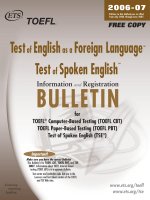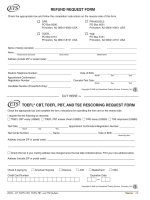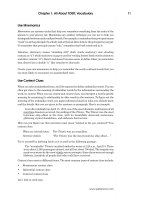Tài liệu 50 harvard essays part 4 doc
Bạn đang xem bản rút gọn của tài liệu. Xem và tải ngay bản đầy đủ của tài liệu tại đây (391.46 KB, 10 trang )
Essays are for reference only. Do NOT copy or imitate anything!
Plagiarism is severely punished!
chance to demonstrate her ability to describe contrast.
The reader may be slightly disoriented by the lack of context for the story, as we are
not told where the author is or why she is climbing a mountain. However, through
the carefully controlled description the author reveals her reflective nature and
personal realization as she ascends and descends the mountain, hence, showing the
parallel physical and emotional progression. Her concluding sentence, though not
particularly poignant, serves as a strong summary of a well-written piece.
A night Unforgotten
By Frederick Antwi
An hour before the commencement of the personality contest, I deposited my bag
carefully in a corner of the changing room. From my vantage point, I could see the
muscular seniors comparing their lovely three-piece suits and musing about which
one of them would win the title. A bony, stuttering junior with no suit and no new
shoes, I swallowed hard and resolved to give the pageant my best shot. Since the
first round of the program was a parade in traditional wear, I nervously pulled out
my kente, draped the beautifully woven red and yellow fabric around my thin frame,
pinned on my “contestant number five” badge and hurried to take my place in line.
Wishing hopelessly that my mother was among the spectators and not working in
some hospital in a foreign country, I stepped out onto the polished wooden stage.
Immediately, one thousand two hundred curious eyes bore into me. My cheeks
twitched violently, my throat constricted and my knees turned to jelly. I fought for
control. Bending my arms slightly at the elbows, I strutted across the stage in the
usual fashion of an Asante monarch and mercifully made it back to the changing
room without mishap. The crowd erupted into a frenzied cheer. As I returned for the
“casual wear” round, something magical happened.
It was singular emotion that no words can describe. It began as an aching,
beautifully tenderness in the pit of my stomach, gradually bubbling into my chest,
filling me with warmth and radiance, melting away all the tension. Slowly, it
effervesced into my mouth, onto my tongue and into words. As I spoke to the crowd
of my pastimes and passions, words of such silky texture poured out from my soul
with unparalleled candor and cadence. The voice that issued from my lips was at
once richer, deeper, stronger than I had ever produced. It was as though an inner
self, a core essence, had broken free and taken control. Severed from reality, I
floated through the remainder of that remarkable evening.
One hour later, the baritone of the presenter rang out into the cool night air. “Mr. GIS
Personality 1993, selected on the basis of confidence, charisma, cultural reflection,
Essays are for reference only. Do NOT copy or imitate anything!
Plagiarism is severely punished!
style, eloquence, wit and originality, is Contestant number…”
“Five! One! Five! Five!” roared the electrified crowd.
My heart pounded furiously. My breathing reduced to shallow gasps.
“Contestant number five!” exploded the presenter in confirmation.
For a few sacred moments, time stopped. My ears screamed, and my lower jaw,
defying the grip of my facial muscles, dropped like a draw-bridge. Then I rushed
forward, bear-hugged the presenter and embraced everyone else I could lay my
hands on! Amidst the tumult, the Manager of KLM Airlines mounted the stage,
presenting me with a meter-long Accra-Amsterdam-London return ticket. As I stood
brandishing my sky-blue cardboard ticket, posing shamelessly for the cameras and
grinning sheepishly at the throng, a pang of regret shot through me. If only my
mother could have been in that crowd to witness and indeed be a part of this most
poignant of all memories.
ANALYSIS
“ The unusual experience” is a staple of college entrance essays, but in this case the
experience is truly unusual-a personality contest for men. It’s also interesting to see
Antwi’s transformation from shy to superstar. Antwi concentrates on a fixed event in
time and uses it to show the spectrum of his personality-shy, confident, excited,
lonely- in an amusing and entertaining way.
It’s no wonder Antwi won the contest. He’s a great storyteller. He has an acute sense
of detail-“one thousand and two hundred curious eyes,” “the fashion of an Asante
monarch”-and is good at heightening drama. The essay is also upbeat and fun to
read.
It would have been nice to know what Antwi said in the third paragraph instead of
simply reading about the “unparalleled candor and cadence” with which he spoke.
Also, Antwi does not explain the what, where, or why of the contest, which are all
important to know. Overall, however, his personality shines through as stellar.
Banana
By Nathan W. Hill
Essays are for reference only. Do NOT copy or imitate anything!
Plagiarism is severely punished!
I was hungry and the sun impaled me on its searing ray. I wore a wool coat, black
with red cotton lining. It had served me well in the misty foothills of the Himalayas,
where His Holiness, the Dalai Lama, gave his blessing. The coat had recently
returned from a long absence. I wore it despite the heat.
The humid weather and the final wilting blossoms of late September conspired to fill
my head with snot. The mighty hammer, Mjollnir, pounded his lament between my
ears.
I walked down to The Barn, our cafeteria, but it wouldn’t open again until three.
Then, I remembered Clint, my junior year English teacher, and walked back to the
Upper School. Clint always kept a few overripe bananas in the fruit bowl with the
past due vocab tests. Laura, who shared the office, complained of the fetid smell of
rotten fruit and that Clint made grunting noises as he worked hunched in his bow tie,
over a mound of disheveled papers. On occasion, he stretched his arm towards
Laura’s desk and asked her, with a bruised banana dangling from his hand, “Would
you like a banana, Laura?” With a crinkled nose, Laura always politely replied, “No,
thank you, Clint,” and watched in disgust as he wolfed it down.
The heavy wooden door to Clint’s office stood propped open because of the heat.
Inside, a small electric fan sat on top of the computer, it made an obnoxious noise
between the sound of buzzing bees and chomping teeth. A tiny strip of paper darted
before the spinning blades. Clint looked up from his work and asked with nasal
condescension, “Can I help you, Nate?”
I responded phlegmatically, “May I have a banana?” the sweat dripping off the end
of my nose.
With a mixture of pity and reproach, he raised his arm to point at the wooden bowl
on top of the gray file cabinet. I lifted three vocab tests away.
I grabbed it, soft and brown. Its sweet aroma distracted me from the throbbing of
my head. I held the banana in my right hand, and moved my left hand to its stem,
ready to divest my prey.
A thin sticky liquid started seeping through my hand. Not expecting a banana to leak
I dropped it, and heard a low thud, followed by splattering.
The banana burst open; its mushy yellow guts flew. A dripping peel remained of my
search for happiness.
Essays are for reference only. Do NOT copy or imitate anything!
Plagiarism is severely punished!
ANALYSIS
Hill has taken the basic narrative form in this essay and transformed it into
something memorable. While Hill has alluded to the fact that he was in the
Himalayas and that he was given a blessing by the Dalai Lama, he does not dwell on
those events, however significant or unique. Rather, he chooses to concentrate on
simple topics: hunger and a coveted banana.
The strength of Hill’s essay rests with his descriptive language. The end of the essay
particularly impacts the reader with vivid imagery. Few who read this essay will
forget the image of an overripe banana exploding. Hill’s phrasing is at times
perfect:”…ready to divest my prey,” is one such example of convincing, powerful
language. Hill has conveyed the exact magnitude of his hunger and desire for that
banana with this phrase.
A few areas could be strengthened, however. Hill is somewhat meandering in his
opening, touching on topics like the Dalai Lama and the Himalayas, which though
interesting are not significant to the main thrust of the narrative. Also, Hill’s use of
dialogue and the description of Clint and Laura are a little awkward. He might have
done better to have simply expanded upon the latter paragraphs of his essay,
focusing more on the banana and his hunger and omitting this dialogue and the
description of Clint. Despite these small complications, Hill has done the trick and
produced an essay that demands attention and respect.
A Lesson About Life
By Aaron Miller
Finally the day had arrived. I was on my way to Aspen, Colorado. I had heard
wonderful stories about the Aspen Music School from friends who had attended in
previous years, and I was certain that this summer would be an unbelievable
learning experience. I was especially excited to be studying with Mr. Herbert Stessin,
an esteemed professor from the Juilliard School.
After just a few lessons with Mr. Stessin, I knew that I would not be disappointed. Mr.
Stessin is so incredibly sharp that no detail gets but him. He notices every turn of
each musical phrase, catches wrong notes in complex chords, and interjects his wry
sense of humor into every lesson. As I was preparing Beethoven’s Sonata, Op.31,
No.3, for a master class, he warned me at the end of a lesson, “Don’t play this too
well, Aaron, or I’ll have nothing to say!”
Essays are for reference only. Do NOT copy or imitate anything!
Plagiarism is severely punished!
The master class went quite well considering that it was my first performance of the
sonata. A few days later, as I walked across the bridge over the creek which winds
through the music school campus, I saw Mr. Stessin’s wife, Nancy, who was also on
the Aspen faculty. I waved to her, and as I walked past she said something to me
which I didn’t catch over the roar of the rushing water. I stopped for a moment as
she repeated, “That was a very nice Beethoven you played the other day.” We had a
brief conversation, and I was touched by her thoughtful comment.
On July 15 I had my last lesson with Mr. Stessin, and walked with him to the dinning
hall. As I was sitting down with my friends to have lunch, someone whispered to me,
“Mrs. Stessin passed out!” we naturally assumed that she had fainted from the
altitude or the heat. However, we soon realize that the situation was more serious,
as an ambulance was called to take her to the nearby hospital.
Nothing could have prepared me for the news that two distraught friends brought
late that night to my roommate and me. Mrs. Stessin had never regain
consciousness and had died of a ruptured aneurysm. That night, my roommate and
I could not sleep; we talked about our memories of Mrs. Stessin for hours on end. In
the morning, Dean Laster called us together to officially announce the sad news.
Numb with disbelief that this vibrant and dedicated woman was gone, we wondered
how Mr. Stessin could possibly cope with this terrible tragedy. Surely he would be
heading back to New York as soon as arrangements could be made.
I couldn’t have been more wrong. Only days after, Mr. Stessin was back in his studio,
teaching!
Initially shocked by Mr. Stessin’s decision to stay, I soon began to understand his
thinking. He and his wife had been teaching at Aspen for many years and had built
a strong sense of community with the faculty and students. Furthermore, I realized
that he found comfort through his love of music and his commitment to his students.
Leaving Aspen would have meant leaving behind his fondest memories of Nancy.
After studying a Mozart piano concerto with Mr. Stessin all summer, I was fortunate
to have the opportunity to dedicate my performance to the memory of Mrs. Stessin.
At the end of the concert, my last evening in Aspen, I was greeted by friends and
faculty members backstage. When I saw Mr. Stessin approaching me, he was
beaming. “That was a wonderful performance!” he said, and gave me a hug. He
continued, “And thank you for the dedication. I’ll miss you.” We hugged again.
Laste summer did indeed turn out to be an unbelievable learning experience.
Although Mr. Stessin taught me a great deal about music and the piano, in the end
his greatest lesson about life.









